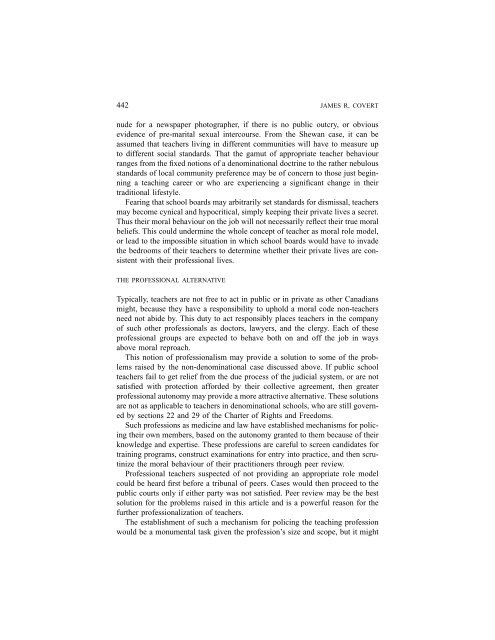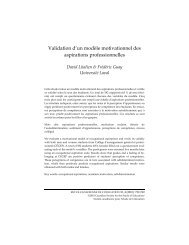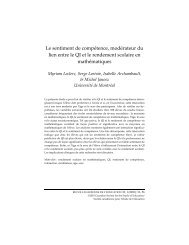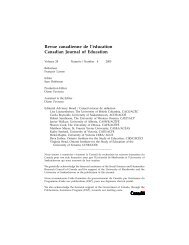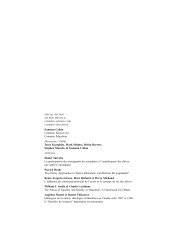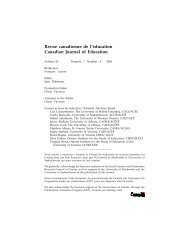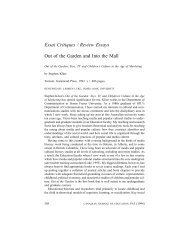Mireille Falardeau et Michel Loranger Le choix de stratégies ... - CSSE
Mireille Falardeau et Michel Loranger Le choix de stratégies ... - CSSE
Mireille Falardeau et Michel Loranger Le choix de stratégies ... - CSSE
Create successful ePaper yourself
Turn your PDF publications into a flip-book with our unique Google optimized e-Paper software.
442 JAMES R. COVERT<br />
nu<strong>de</strong> for a newspaper photographer, if there is no public outcry, or obvious<br />
evi<strong>de</strong>nce of pre-marital sexual intercourse. From the Shewan case, it can be<br />
assumed that teachers living in different communities will have to measure up<br />
to different social standards. That the gamut of appropriate teacher behaviour<br />
ranges from the fixed notions of a <strong>de</strong>nominational doctrine to the rather nebulous<br />
standards of local community preference may be of concern to those just beginning<br />
a teaching career or who are experiencing a significant change in their<br />
traditional lifestyle.<br />
Fearing that school boards may arbitrarily s<strong>et</strong> standards for dismissal, teachers<br />
may become cynical and hypocritical, simply keeping their private lives a secr<strong>et</strong>.<br />
Thus their moral behaviour on the job will not necessarily reflect their true moral<br />
beliefs. This could un<strong>de</strong>rmine the whole concept of teacher as moral role mo<strong>de</strong>l,<br />
or lead to the impossible situation in which school boards would have to inva<strong>de</strong><br />
the bedrooms of their teachers to d<strong>et</strong>ermine wh<strong>et</strong>her their private lives are consistent<br />
with their professional lives.<br />
THE PROFESSIONAL ALTERNATIVE<br />
Typically, teachers are not free to act in public or in private as other Canadians<br />
might, because they have a responsibility to uphold a moral co<strong>de</strong> non-teachers<br />
need not abi<strong>de</strong> by. This duty to act responsibly places teachers in the company<br />
of such other professionals as doctors, lawyers, and the clergy. Each of these<br />
professional groups are expected to behave both on and off the job in ways<br />
above moral reproach.<br />
This notion of professionalism may provi<strong>de</strong> a solution to some of the problems<br />
raised by the non-<strong>de</strong>nominational case discussed above. If public school<br />
teachers fail to g<strong>et</strong> relief from the due process of the judicial system, or are not<br />
satisfied with protection affor<strong>de</strong>d by their collective agreement, then greater<br />
professional autonomy may provi<strong>de</strong> a more attractive alternative. These solutions<br />
are not as applicable to teachers in <strong>de</strong>nominational schools, who are still governed<br />
by sections 22 and 29 of the Charter of Rights and Freedoms.<br />
Such professions as medicine and law have established mechanisms for policing<br />
their own members, based on the autonomy granted to them because of their<br />
knowledge and expertise. These professions are careful to screen candidates for<br />
training programs, construct examinations for entry into practice, and then scrutinize<br />
the moral behaviour of their practitioners through peer review.<br />
Professional teachers suspected of not providing an appropriate role mo<strong>de</strong>l<br />
could be heard first before a tribunal of peers. Cases would then proceed to the<br />
public courts only if either party was not satisfied. Peer review may be the best<br />
solution for the problems raised in this article and is a powerful reason for the<br />
further professionalization of teachers.<br />
The establishment of such a mechanism for policing the teaching profession<br />
would be a monumental task given the profession’s size and scope, but it might


